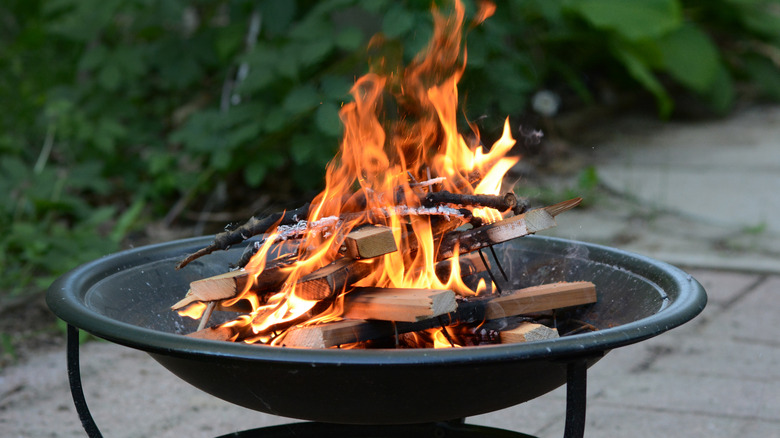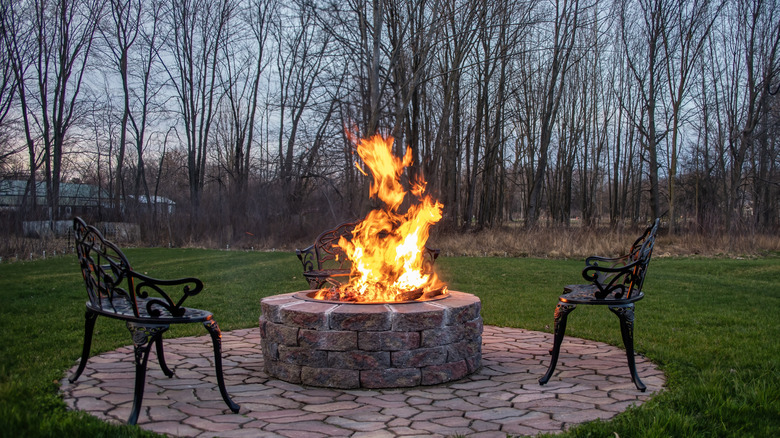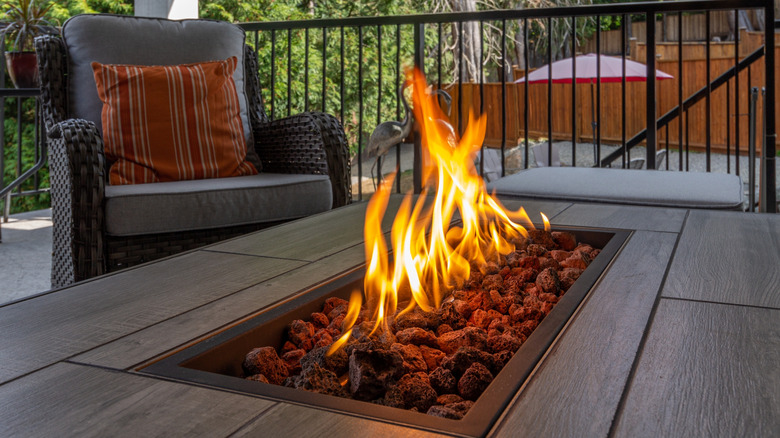Why Your Backyard Fire Pit Is Making Your Neighbor Angry
We may receive a commission on purchases made from links.
Fire pits are a popular backyard focal point, and there are plenty of reasons people enjoy them. On cool nights, they can keep you warm and provide a cozy outdoor atmosphere, perfect for gathering with friends and family. Fire pits offer a great space for roasting hot dogs and marshmallows, which is a fun, novel experience people like to have from time to time. Another more practical reason people have fire pits in their backyards is to burn yard debris and other waste. Your neighbors, though, might not be as thrilled about your backyard fire as you are. Air pollution, odors, heavy smoke, and the risk of the fire spreading are reasons for this.
Being a good neighbor can positively impact everyone in the neighborhood's day-to-day experience, including yours. Learning more about why your fire pit might be making your neighbors angry is probably a good idea. After learning about the downsides of having backyard fire pits, you may find that doing away with yours is the best decision for everyone.
The downsides to backyard fire pits
One of the major issues with backyard fire pits is the smoke they emit. This smoke can contain harmful toxins, such as formaldehyde and benzene, as well as particulate matter (harmful airborne microscopic substances), which contributes to air pollution. In fact, a single wood-burning fire ring emits as much particulate matter as the secondhand smoke from 800 cigarettes. This is especially harmful to children and people with respiratory conditions like asthma.
Fire pit smoke can also release strong odors, affecting neighbors and disrupting the environment. Depending on the size of the fire and the weather conditions, smoke can travel quite far, potentially making your fire pit a nuisance to the whole neighborhood or beyond. What you burn impacts the smell of your backyard fire, as well. For example, poplar is said to have an unpleasant smell of burned, as does damp wood.
Finally, backyard fire pits increase the risk of accidental wildfires — something sure to anger the neighbors and put lives at risk. Whether you are using gravel around your backyard fire pit or have concrete blocks stacked around it, the fire can still spread. Wind can cause embers to become airborne, and if the weather conditions are dry, the fire can spread quickly. A spark screen over your fire and a bucket of water on hand can help reduce this risk, though.
Fire pit alternatives that won't upset the neighbors
If you want the comfort of a backyard fire but don't want to upset the people that live around you, there are smokeless fire pits you could consider. Propane fire pits provide both warmth and a comforting flame. Adding lava rocks or fire glass can help with heat conduction for added warmth, as well. Gas heaters are another great alternative to wood-burning fire pits. These heaters can be mounted to the wall or ceiling of your patio or gazebo. Alternatively, for more open outdoor spaces, the Amazon Basics 46,000 BTU Outdoor Propane Patio Heater is a flame-free, free-standing, tower-style heater. Both gas and propane are smokeless and burn relatively clean compared to wood. They do still release toxic compounds, though, and aren't entirely odor-free.
If, after reading about the downsides to wood-burning fire pits, you want warmth that is safe, odor-free, and doesn't produce any toxic compounds, an electric outdoor heater might be for you, like the Dr Infrared Outdoor Heater. This type of fire pit alternative is completely emission-free and can be installed permanently on the ceiling or wall of your outdoor space. Just like gas heaters, free-standing electric heaters are available as well.


